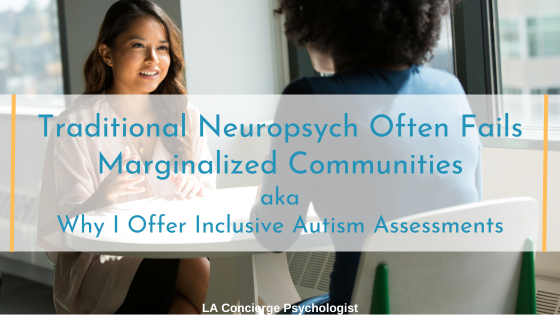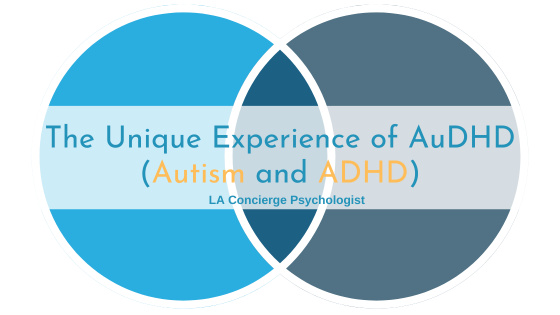As an autistic person (or as the loved one of an autistic person), you may have heard about a concept called ableism. When most people first learn about this notion, they immediately want to know how to fight ableism in society. While that is undoubtedly an admirable goal, combatting ableism requires a complete understanding of what “ableist” means and just how pervasive it is.
What is ableism?
Ableism is discrimination in favor of non-disabled and neurotypical people. People with ableist assumptions and beliefs wrongly assume that everyone should look, act, and think the same way– a non-disabled or neurotypical way. Differences are seen as deficits and defects, which leads to the discrimination and subjugation of neurodivergent and other unique people. (If you’re wondering how to pronounce ableism, it is just like the word “able” with an “ism” sound at the end.)
Ableism affects many different groups of people, including autistic individuals. Many of my ADHD clients struggle with ableism as well. In addition to being offensive and damaging to a person’s self-esteem, ableism places unfair and unnecessary limits on neurodivergent people.
If you’ve been wondering how to fight ableism in society, you should know that the first step is recognizing it in yourself. Ableism is so prevalent that you have probably internalized (i.e., mentally adopted) some ableist notions. If you have been surrounded by ableist ways of thinking your whole life, it is only natural that you would have internalized them to some extent.
By recognizing any ableist attitudes you may have adopted yourself, you can better recognize discriminatory situations. Instead of wondering why certain comments and situations rub you the wrong way, you’ll understand what’s going on. And, for autistic people, rejecting internalized ableism leads to more self-compassion and happiness.
15 signs you may have internalized ableism
Even neurodivergent people or the most neurodiversity-affirmative person may experience one or two of these signs from time to time. However, if you experience three or more of the following signs with any frequency, you may struggle with internalized ableism.
1. You feel like you don’t belong
Maybe people have told you that you need to attend a special school or that you should only pursue certain types of jobs. You submit to other people’s notions of where you do or don’t belong, instead of recognizing that a truly just society would accommodate your needs and differences. When you think of it in terms of physical disabilities, it becomes more obvious. Instead of thinking you don’t belong in a building because there are no ramps for people with wheelchairs, the building should accommodate people in wheelchairs.
2. You believe people when they call you “antisocial,” “entitled,” or “lazy”
Maybe you’ve been accused of being antisocial when declining an invitation to a party. Or perhaps your colleagues think you are entitled for asking for accommodations, or they think you are lazy for turning down a promotion to manager. Buying into such notions yourself may be a sign of internalized ableism. This is because you’ve bought into the greater neurotypical society’s definitions of what is appropriate behavior or the “right” thing to do. If you viewed your behavior through a neurodivergent perspective, it’d be totally understandable why you chose to do the things you did.
3. You always blame yourself
Ableist attitudes have created societal structures that are insensitive to the needs of neurodivergent people. Instead of questioning these structures, you blame yourself for being different when you encounter obstacles. You also blame yourself when people are unkind to you instead of reprimanding them for their lack of empathy or understanding.
4. You’re constantly trying to prove something
If you have internalized the view that your autism is something to be ashamed of, you may go to great lengths to prove how capable you are. On the other hand, you might feel the need to prove that you are autistic to obtain reasonable accommodations, especially if your autistic traits are not easily recognized neurotypical people.
5. You don’t like who you are
Identifying as autistic is hard for you because, in your mind, autism is a defect. You dislike all of the unique parts of being autistic. You struggle to see the strengths and positive aspects of being autistic.
6. You force yourself to take part in activities you hate
The last thing you want to do the day before your family holiday celebration is to go to your office Christmas party. You know that it will be a sensory and social nightmare, possibly leading to burnout. Nonetheless, you agree to go because you believe it’s the “right” thing to do. You don’t recognize that the “right” thing to do is based off of a majority culture not taking into consideration neurodivergent ways of being.
7. You want to get rid of your autism
Instead of trying to learn more about autism and seeking support, you view autism as a problem to be solved. You’ve been researching autism “treatment” options and “cures.” You buy into the attitude that autism is something to be ashamed of or hidden.
8. You never ask for accommodations
Other people’s autism may be more visible than yours, so you worry what people would think if you asked for accommodations. You may feel like you don’t deserve accommodations and that you should be able to do everything independently, without support or assistance.
9. You think you’re bad at everything
Despite your many admirable qualities, you focus on what you’re not good at. Because you’re not good at X, you assume you must be bad at everything else, too. When something unfortunate happens, you immediately think it must be related to your autism.
10. The people in your life view autism as a problem or disease
Your colleagues, friends, or parents think of autism as something to be cured. You notice that they say disparaging things about other autistic people. Perhaps they avoid talking about your autism because they want you to live a “normal” life. Your childhood teachers, college professors, bosses, or other authority figures may also have held similar views, as evidenced by their behaviors, language, or subtle microaggressions. When you’re surrounded by ableist attitudes, sometimes we begin to believe them ourselves.
11. You go to great lengths to hide your autism
Many autistic people mask their autistic traits to some degree in some circumstances. For some, it’s a necessity to be safe in certain situations. However, it may also be a sign of internalized ableism if there are no situations or environments where you feel you can be authentically, 100% autistic you. You are always exhausted from avoiding stimming, regulating your eye contact, or otherwise masking your autistic traits. On the other hand, perhaps you avoid going out at all to prevent others from noticing you are autistic.
12. You are pessimistic about your future
Other people don’t expect you to succeed or do much with your life, so you don’t expect much of your life, either. When you encounter difficulties, you quickly give up without considering how they might be overcome through environmental or internal accommodation. You’ve bought into the idea that, just because you’re autistic, means you’re unable to be achieve your goals.
13. You insist on doing everything your neurotypical peers do
If someone else can do something, you stubbornly insist that you should be able to do it, too. Even if something drains you and frustrates you—and you get no practical benefit from it—you try to do it anyway. You’re driven by the idea that you “should” do certain things that others do.
14. You don’t know any other autistic people
You haven’t been exposed to the positive aspects of autism because there aren’t any other autistic people in your life. News stories that portray autistic individuals as either tragic or heroic are your only source of information about other autistic people. You may even be purposefully avoiding affiliating yourself with other autistic people because you think it’ll draw unwanted attention or speculations.
15. You compare yourself to the most “successful” people
You’ve bought into the greater society’s idea of what “successful” is. You don’t question that certain aspects of “success” don’t actually align with your values, strengths, or talents. Instead, you look around and lament that you don’t have enough friends, even though you love the few, deep friendships you have. You may be frustrated that you don’t enjoy going out to bars like others, even though you’re quite happy staying in and playing D&D.
Did you recognize yourself in some of these signs?
If you recognized yourself in the above descriptions, please don’t be too hard on yourself. It is *not* your fault that you were raised in a society that thinks this way. Consider this: now that you have recognized your ableist tendencies, ableist thoughts will have much less power over you.
It takes time to make this mental and emotional transition, but it is worth the effort. When you become more accepting of yourself as an autistic person, you will find it easier to accept your limitations and celebrate your strengths. You won’t allow the ableist ideas of other people to limit, discourage, or demean you.
As you get better at recognizing ableist assumptions within yourself, you will learn how to spot them in others. This is a necessary first step for anyone who wants to combat ableism in society.
I can teach you how to stop internalizing ableism
As neurodiversity-affirmative therapists, we embrace and celebrate neurological variances, including autism. Rather than trying to “fix” or “treat” you, we will support you, encourage you, and help you to learn more about yourself. Learn about autism therapy or contact Dr. Crystal I. Lee or Dr. Jenifer Goldman for a free, 20-minute phone consultation.



